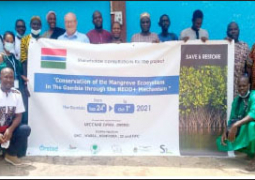
The graduation ceremony was held at school premises in Busumbala.
Those students underwent intense courses in solar PV system installation, satellite, installation, electronics security system, hair dressing, tiling and plastering, vehicle diagnostic techniques and repair and aluminum fabrication and installation.
At the graduation ceremony, Kebba Sillah, Chief Executive Officer (CEO) of STTC, emphasised the importance of the event, which he said, is to confer certificates to the young Gambians who have undergone skills training in various disciplines.
The skills acquired, he added, would significantly contribute in no small measure to the socio-economic status of the country.
“Sterling Technical Training Centre over the years expanded its operations across the country by setting two mobile training units in Bansang and Janjanbureh and an annex campus at Basse to make TVET accessible to rural Gambians.”
He recalled that from 2021 to 2021, STTC signed contracts with many partners among whom are University of The Gambia WASCAL Project to train 210 youths in solar PV system design, installation and maintenance, International Trade Centre through Youth Empowerment Project (YEP); and JSF project to train 140 youth and the Ministry of Trade Integration and Employment (MOTIE) /EPSDP project to train 40 youths and other private students.”
He added; “Our objective as an institution is premised on providing training on special skills that are reflective to the job market creation of self-employment which we believe have a direct impact on reduction of unemployment and irregular migration.”
Yusupha Keita, International Trade Centre (ICT) representative,revealed that jobs, skills and finance project and YEP are partnering to implement the SKYE, the JSP program, which is aimed at creating green jobs for youth and women through technical skills development, financial inclusion of local stakeholders, thereby mitigating climate change and reinforcing sustainable economic development.
These two projects, he added, recognise the role of TVET in imparting skills in young people and contributing to the growth of the country, cannot be overemphasized.
“Thus, the massive investment in the sector. The projects have supported the development of the TVET roadmap, sector skills councils, launch of formalised apprenticeship which currently is offering training opportunities to 70 young people, refurbishment of TVET centers, start-up kit support, grants, and training of over 4000 youth and women.”
Those initiatives he added, are geared towards ensuring the TVET sector meets the ever-changing industry dynamics, employment opportunities and support the competitiveness of the Gambian economy.
Basiru Secka, principal Employment Economist at the Ministry of Trade, acknowledged that the Centre has been a close partner of the entrepreneurship and private sector development project (EPSDP) of the Ministry of Trade.
He extolled the excellent relationship that existed between the project and SSTC, saying the relationship have yielded significant achievements over the years.
“The issue of employment remains a challenge on both the global and domestic scenes as serious challenges require urgent and collaborative efforts to address.”
The government of The Gambia, he also added, has recognised the threats those challenges pose to national stability, economic growth. This development has shown commitment to its obligation to provide decent work for all.
In his vote of thanks, Lamin Saidykhan, a graduate student, hailed the school management for providing them with the conducive environment during their course at the school.
He advised his fellow students to make the best use of the knowledge acquired at the centre.





